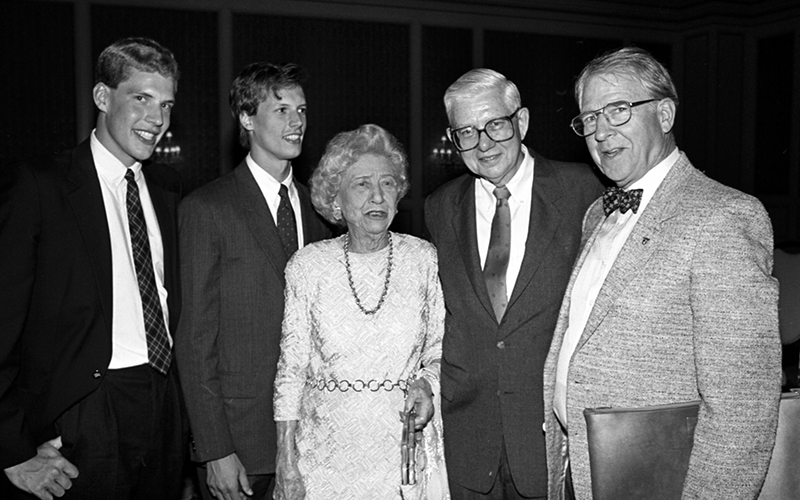The next McKelvey era
Jim McKelvey Jr. is well known for being an innovator and serial entrepreneur. Find out how his gift to name the McKelvey School of Engineering will spur innovation within the school
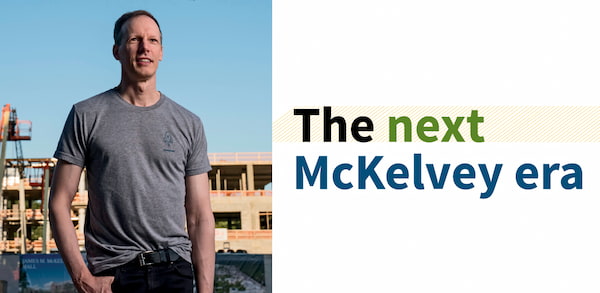
It was a day long in the making — 162 years, in fact. Since its founding in 1857, the School of Engineering & Applied Science at Washington University in St. Louis built its reputation on its name. As of Jan. 31, 2019, and after more than one and a half centuries of growth and innovation, the school entered a new era as the McKelvey School of Engineering, thanks to a transformative investment by alumnus Jim McKelvey Jr. and his wife, Anna.

McKelvey, who earned degrees in computer science and economics at WashU in 1987, is a serial entrepreneur and has founded or co-founded multiple startups, including Square, the mobile payment company; LaunchCode, a nonprofit organization that helps companies find skilled workers for the growing number of tech jobs and provides free coding courses for those seeking a technology career; Third Degree Glass Factory; Mira Publishing, which he founded as an undergraduate student; and most recently, Invisibly, which works in the ad tech and media industries. In addition, he is a Washington University trustee, an independent director of the St. Louis Federal Reserve and a partner with FinTop, a venture capital firm he co-founded in 2017 that focuses on financial technology companies.

McKelvey's investment solidifies the school's position as a leader in research and education and will bolster the school's ambitious strategic plan, including support for student scholarships and new faculty professorships, as well as the flexibility to meet future priorities to advance the school's impact on lives and communities both in St. Louis and worldwide. Specifically, the gift will allow the school to marry innovation with science in research; grow the relevance and strength of computing for both education and research; attack great engineering challenges through which the university can have a meaningful impact by hiring outstanding faculty; and elevate the engagement of the school through entrepreneurship.
"Under the strong leadership of Dean Aaron Bobick, the Engineering school is positioned for true greatness, and this is the right time to step forward with this investment," McKelvey said at the Jan. 31 announcement. "Engineering fields are moving at an exponential growth rate, and to keep up with that requires tremendous investment of resources: human, physical and financial."

Bobick, also the James M. McKelvey Professor, said the commitment allows the school to advance into the next tier of top engineering programs worldwide.
"Early on, our school was almost 100 percent focused on education," Bobick said. "It then turned a corner and became about education and fundamental research. Now it's time to turn another corner and be about education, fundamental research and innovation."
Bobick said the potential for innovation is what makes research important, and research is what makes innovation possible.
“Jim’s great talent is that he can see an opportunity, recognize that it’s not rocket science to go after it, but knows that you just really have to go after it — and he’s relentless. Instilling some of that understanding of the opportunity is a great lesson for our students and for our faculty.”
— Aaron Bobick, Dean
"Innovation is about creating novel solutions to significant problems, about exploring solution spaces, with a necessary emphasis on design, experimentation, failure and iteration," he said. "We will still place great effort on elevating the significance, caliber and amount of research, because research strength is what attracts great faculty and drives reputation. But our next focus is how do we fit within the innovation ecosystem within St. Louis? What does it mean for us to do innovation in engineering at Washington University in St. Louis?"

With the McKelvey name, the school must live up to the bar that McKelvey sets for the impact of innovation, Bobick said.
"Jim McKelvey Jr. is pretty sure that he's really nothing special, and he just gets lucky because he's persistent," Bobick said. "While it's clear he is undoubtedly special, Jim's great talent is that he can see an opportunity, recognize that it's not rocket science to go after it, but knows that you just really have to go after it — and he's relentless. Instilling some of that understanding of the opportunity is a great lesson for our students and for our faculty."
The gift will not only provide for new professorships within McKelvey Engineering, but in interdisciplinary programs that partner with Engineering as well, particularly those that partner with computing, such as systems engineering, data science, chemistry, physics and business.
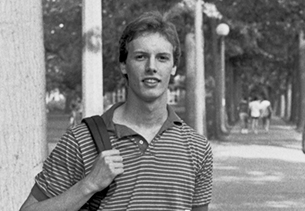
"Attracting faculty who want to sit at that intersection is critical to growing that effort," Bobick said. "Every branch of engineering research and innovation relies on computing not only to reveal novel insights from traditional analytical modeling, but also to procure data and analyze systems for which analytical models are not available.

In an interview, McKelvey shared his vision for the school.
"I want to see WashU, engineering in particular, but the institution in general, as a talent magnet and talent creator for St. Louis and the world," McKelvey said. "One of the things that motivated me to give the gift was the potential to open the doors of WashU to people who would probably never consider coming to our school. I want them to feel welcome and for them to be part of a larger community."
In conjunction with opening the doors wider, McKelvey is committed to increasing diversity in the school.
"If you're doing anything creative, the more perspectives you can bring, the better your potential set of outcomes is," he said. "I think it's important for society that we don't want to create elite universities that cater only to elite students. I think we want to have as much diversity in thought and age and everything as possible."
“My father is a living example of patience and humility. When I ask for advice, he does not pontificate. But watching him, I just absorb the spirit of someone who is always charitable and kind and modest but also very accomplished.”
— Jim McKelvey Jr.
During Bobick's tenure as dean, he has supported student and other organizations that help to broaden the school's demographics and its appeal to women and people of color, such as the Women & Engineering Initiative, the National Society of Black Engineers (NSBE) and the Society of Hispanic Professional Engineers (SHPE). McKelvey's gift will allow for continued support of increasing the school's diversity.
McKelvey also is interested in increasing the school's connections.
"I would offer myself as an example of somebody who really didn't have much direction and serendipitously encountered these fantastically talented students and professors and wonderful resources at Washington U. and changed my life," he said. "It's very scary as a young person, even a young person with a lot of talent, to feel like you've got to make all the right calls when you're 19 or 20. My message would be that you don't have to get it right, but it would be a shame to make decisions that decrease options in the future. One of the great things about Washington U. is it massively increased my options, and I'm hoping to make that available to other people."
McKelvey also gave the gift to honor his father, James M. McKelvey Sr., who was dean of the school for 27 years and transformed it from a regional program into a nationally prominent research institution.
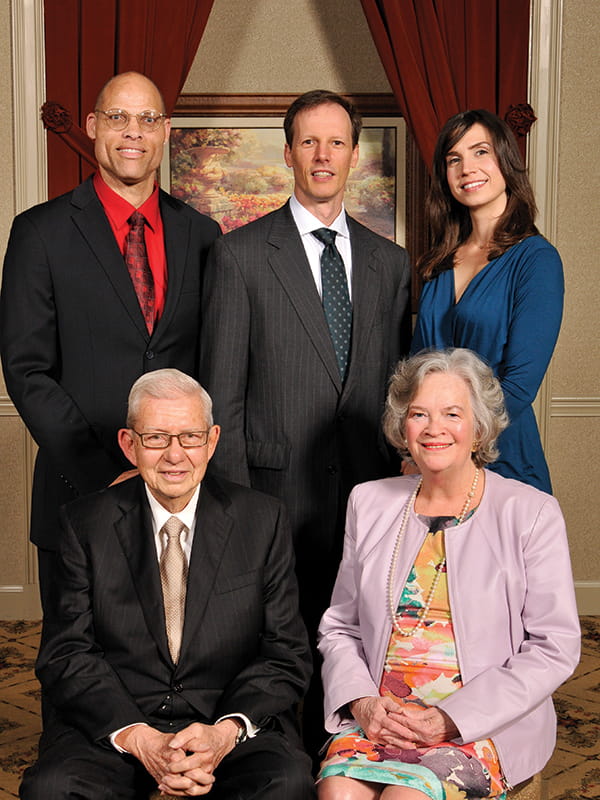
"My father is a living example of patience and humility," McKelvey said. "When I ask for advice, he does not pontificate. But watching him, I just absorb the spirit of someone who is always charitable and kind and modest but also very accomplished. And that's a great role model, and I learn from him every time."
During his more than quarter-century tenure as dean, McKelvey Sr. led the school to prominence in engineering research, education and innovation. He launched the Engineers' Scholarship Program, the Dual Degree Program and the Cooperative Education Program. Under his visionary leadership, three new buildings — Bryan, Lopata and Jolley Halls — were constructed. The school's endowment grew more than tenfold, from $4 million to nearly $52 million, and research expenditures grew substantially. Although he officially retired in 1996, McKelvey Sr. continued teaching in the chemical engineering department through the 2007-2008 academic year.
McKelvey's gift is the latest in representing the family's commitment to Washington University. In 2016, he gave $15 million to build James M. McKelvey, Sr. Hall on the east end of campus to house the Department of Computer Science & Engineering and support the university's data science efforts. His wife, Anna; his father; his late mother, Edith McKelvey; and his stepmother, alumna Judith McKelvey, MD, have been loyal to the university's success for decades.
"We are a Washington University family through and through," he said. "This university has meant so much to us, and it is my privilege to continue our role in providing for the Engineering school's future."
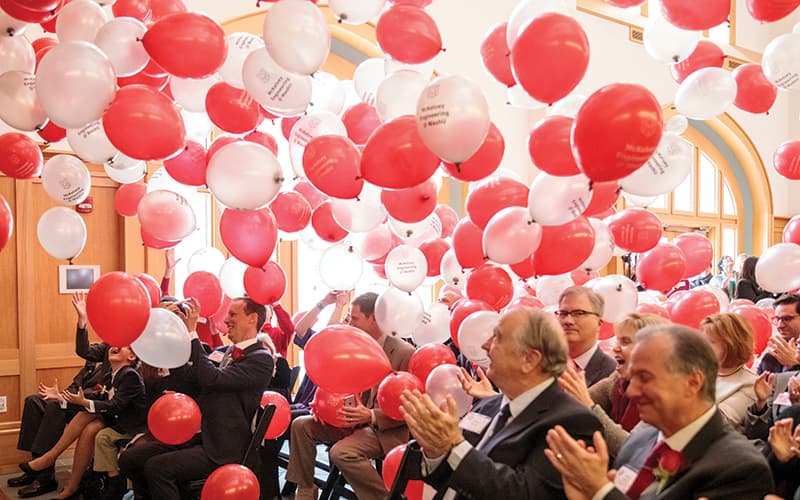
In addition to the naming gift, Jim and Anna established the $30 million McKelvey Engineering Challenge, which allows alumni, parents and friends to contribute to expanding opportunities for students, bolstering cutting-edge research and providing modern facilities. The three-year challenge will provide matching funds to support endowed scholarships, endowed professorships, the school's annual fund, the state-of-the-art James M. McKelvey, Sr. Hall and the Henry A. and Elvira H. Jubel Hall, and for other Engineering projects.
McKelvey said he remembers coming to campus as a toddler and knew early on he wanted to attend Washington University. He began as an economics major, then added computer science courses and later took courses in the Sam Fox School of Architecture. Because of that, some of the matching funds will support professorships in the Computing + X initiative, which will allow students to combine computational thinking with other disciplines outside of Engineering, such as music, social work, political science or economics.
James M. McKelvey Sr. Dean, 1964 to 1991
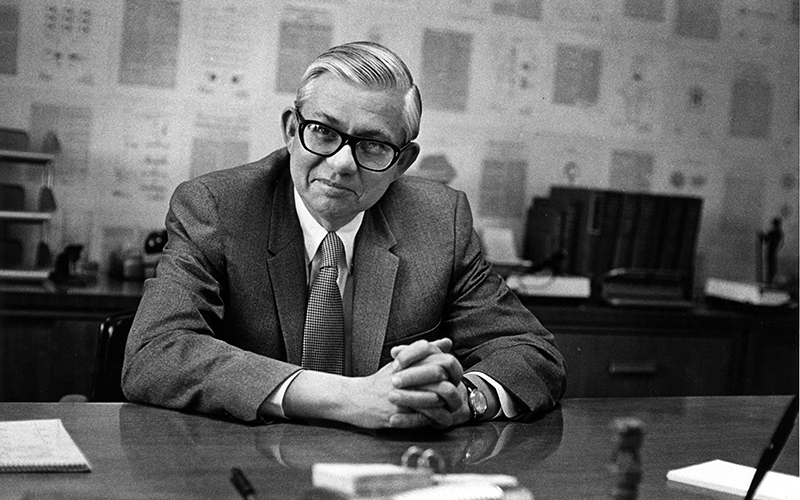
James M. McKelvey Sr.'s vision helped transform the School of Engineering & Applied Science from a regional program to a nationally recognized research institution throughout his 27 years as dean.
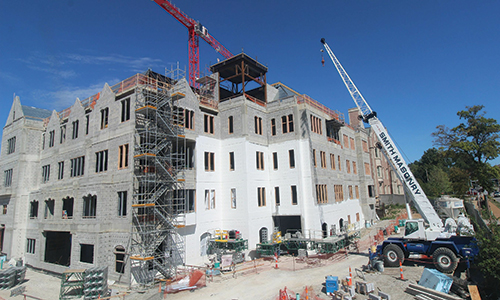
The former dean grew up in University City. After earning an undergraduate degree in chemical engineering from the University of Missouri-Rolla, he returned to St. Louis, earning a master’s in chemical engineering in 1947 and a doctorate in chemical engineering in 1950, both from Washington University.
After his doctoral studies, McKelvey Sr. joined DuPont, where he researched polymer processing, becoming a pioneer in the field. In 1954, he joined the faculty of Johns Hopkins University and in 1957, he returned to Washington University as an associate professor of chemical engineering. In 1960, he became a full professor and in 1962, he was named department chair. Two years later, McKelvey became the seventh dean of the university’s Engineering school, a position he held from 1964 to 1991.
Washington University has honored McKelvey Sr. with the William Greenleaf Eliot Society’s Search Award and with an undergraduate research award established in his name. His contributions have also been recognized throughout the years by the school, which has bestowed upon him its Alumni Achievement Award, Distinguished Faculty Award and Dean’s Award. In 2003, John F. McDonnell and the JSM Charitable Trust established the James M. McKelvey Professorship in his honor.
Continuing his steadfast commitment to the university, McKelvey Sr. serves on the Planned Giving Committee and was a volunteer for the Engineering school’s efforts in Leading Together: The Campaign for Washington University.
